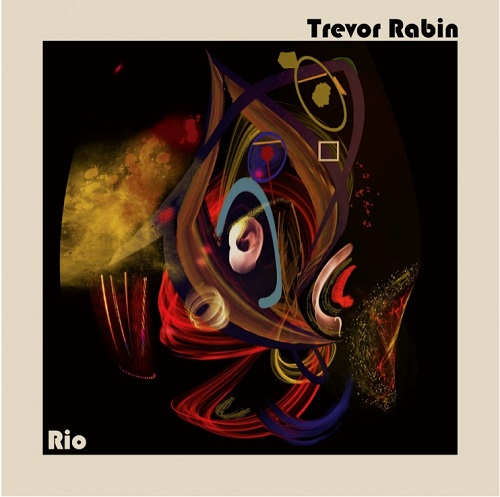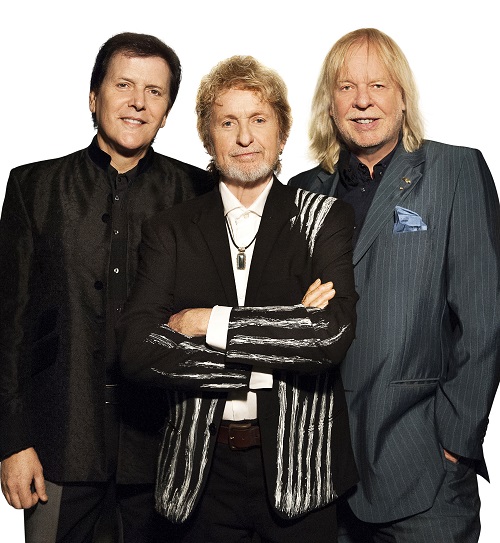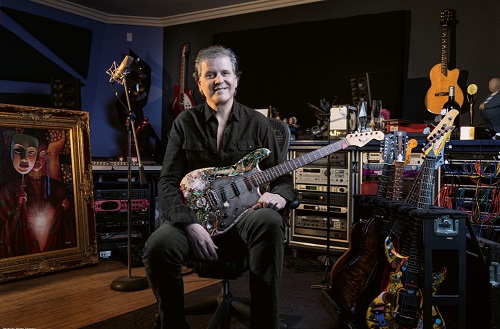By Shawn Perry
The metrics surrounding Yes could confound even the savviest of analysts investigating the band’s history and its spiraling roster of members. Without playing favorites, in that analysis, you can’t ignore the vast contributions from Trevor Rabin, which came at a time when bands like Yes were edging toward extinction.
Indeed, he was a tad younger than the other members of Yes. What he really brought to the band, however, was a keen ear and modern sensibility — as a guitarist, as a singer, as a songwriter, as a producer, as an all-around virtuoso whose capabilities exceeded the high standard of any progressive rock institution.
Chances are if you’re reading this piece, you know what happened. On the strength of 90125 and Rabin’s “Owner Of A Lonely Heart,” Yes sold millions of records and tore up the charts like never before. After 1994’s Talk — which he solely produced, mostly wrote, and played a multitude of instruments on — Rabin left the Yes fold. He released and toured behind his fourth solo record Can’t Look Away, then ventured off to Hollywood to become an in-demand film composer. As lucrative as film composing was and, in some respects, to continues to be, for Rabin, he was anxious to make another solo album.
“I did an instrumental album (Jacaranda) in 2012,” he told me during a lunchtime call. “I really enjoyed it and it really got into my bones. I was so busy with film scoring I couldn’t breathe. Then the Hall of Fame thing happened, and Jon (Anderson) and Rick (Wakeman) and I said, ‘We should do some shows.’ I thought maybe we could do five or six shows and have some fun with it. Those five or six shows turned into 200 shows.”
In the midst of forming a new band, Rabin would tell me, was the rather “silly idea” of changing the erstwhile name of “Anderson, Rabin, Wakeman” or, “ARW,” if you’re into the whole brevity thing, to “Yes Featuring ARW”. It merely muddied the waters of an already tense situation between two camps attached to the Yes name. Without anything to move forward with, followed by the pandemic, the idea of continuing ARW in any form eventually faded away.

For Rabin, it meant going onto the next big thing — making Rio, a solo album with vocals. “I’d been promising myself for many decades that I’ve got to do another album after my last vocal album,” he explains, adding that he was initially inspired by what he had started with ARW.
“When that finished, which was great fun. I thought, ‘You know what? I’ve got to do an album. I’ve got all these ideas. It’s kind of bursting my pockets open. I need to get in the studio, I’ve got to do it. It just became clear that I needed to do a solo album.”
During his time with ARW, Rabin was asked by Sony Inside Out Records to produce an album featuring the group. He wasn’t completely on board with the idea. “I was a little reluctant. I said with the most affection I can possibly say: ‘Yes is like a beached whale — It’s beautiful when it’s in the ocean but getting it in there is bloody hard.’”
He kept his options open and sent a finished recording of Rio to Inside Out. Within days, he had a record deal. “It was just so simple and clean and peaceful.” Rabin remembers. “It was quite an amazing signing.” And quite an impressive package when you take view at all the working parts.
Listening to Rio, you sense a culmination of everything there is to appreciate about Trevor Rabin’s talents. Songs like “Big Mistakes” and “Push” both have that big and no-holds-bar style Rabin brought to Yes in the 1980s. Yet there’s an even deeper dig on Rio, one that fleshes out Rabin’s gifts of musicality in full formation.
His father was the first violinist with the Johannesburg Symphony Orchestra, so naturally Rabin began his music lessons early, starting on piano at age 5, then graduating to guitar at 12. His achievements at such a young age placed him in a pantheon of prodigies. Even his father was impressed with his son’s musical development. “He used to make the joke that I could read music before I could read English,” Rabin quips.
“Oklahoma,” the third single from Rio, showcases Rabin’s skills as a musician, producer, arranger, and songwriter. It’s a stark commentary around the 1995 Oklahoma City bombing that lifts off with a classical acoustic guitar sequence before flowering into an orchestral mesh of electric guitars, keyboards, strings, and an impassioned vocal. Ornamented in multi-layered sonic lushness, the theme, both on a personal and multilateral front, is a reminder of how this one event sent a disarming chill down the nation’s spine.
“I turned on the TV and I saw the federal building and it made me feel sick.” Rabin remarks. The South African native who had seen racism and political strife in his own country had become an American citizen with an optimistic worldview. This act of domestic terrorism wasn’t quite the open-armed welcome he was expecting.
“I had a pit in my stomach, like, ‘Oh my God, if this can happen here, where else can it happen?’ It just led me having some ideas. At the time I thought there’s no way I’m doing a song now. It would be so callous and crass, even if it’s meant in the right way. It would come across as being opportunistic. I didn’t do anything for years. When I started this album, I thought, now’s the time. It’ll be more of a commentary and a tribute to the people that survived and to the people who didn’t.”
Of course, South Africa is still very much on Rabin’s mind as well. The country vibe of “Goodbye” comes from his early years, doing sessions. “Country’s huge in South Africa,” he says. “I did session work for years in South Africa when you might be on a session in the morning with a full orchestra and difficult charts to read; then the afternoon, it’s just chord symbols and it’s a country song, and they just want that twang, the Telly thing with the B-Bender — total country stuff.”
Another one that touches closer to home is “Egoli,” heralded as a celebration of when Apartheid ended in South Africa and Nelson Mandela became president of the country in 1994. “My uncle was Mandela’s lawyer for 27 years. In South Africa, I played at the Princess Trust, which was for Mandela, and was lucky enough to go and have lunch with him, Prince Charles and…believe it or not…the Spice Girls,” he adds with a slight chuckle.
“When Mandela was led free, it was like a celebration. He did the most incredible job. Then he died, and people started forgetting what it was all about. Sadly, the country’s become a bit of kleptocracy,” he pauses before changing course. “‘Egoli’ in Zulu means ‘City of Gold,’ which is Johannesburg. I’m talking about what joy and what hope there was. and don’t let it slip away. Keep remembering what Madiba said.”

Despite the absence of a fully realized ARW album, there were some songs in the works, including “Fragile,” which was re-recorded and added to the deluxe edition of Rio. There are radio takes of the song with Anderson and Wakeman floating around on YouTube, but as far as producing other songs or making an album, that’s about as far as it got.
“We were having so much fun on the road, and there was always talk of ‘we’ve got to do an album’. There was some stuff going between us, but nothing that was even put on tape. A second leg of the American tour came about, and our manager said, ‘You really should have a single or something. Otherwise, you’re just coming out again.’ I pulled out ‘Fragile,’ which was a song I was going to use. I did a TV series with Sharon Stone, and that was going be used there. So I thought, it’s kind of a charming song. Maybe if Jon sang on it, and Rick did his thing on it, it would be legitimate to do it as an ARW thing. We played it on the radio a couple of times, but nothing happened with it.”
Eventually, Anderson, Rabin, and Wakeman all returned to their own solo endeavors, effectively ending their brief union and any further squabbling about the Yes legacy. When it comes to his relationship with other members of Yes, past or present, Rabin doesn’t mince words. “Put it this way, Rick and I are real firm friends…and I have no desire to do anything with Steve.”
He maintained a friendship with bassist Chris Squire right up until his passing. Rabin says Squire teased him about working on computers and scoring movies. “Chris’s thought was, ‘When are you going to stop this desk job? And come back to the band?’”
Squire may be happy to know that his old friend is now “back in the business of rock.” With Rio finished and released, the big question now is what happens next?
“Starting this album was like, ‘Oh my God, I’ve just woken up.’ This is the first one in a long time. I intend to keep on promoting the album. And hopefully, we’ll get on the road.”
Just before saying our goodbyes, he adds in no certain terms: “The next thing definitely is not going be a film — it’s going to be another album.”




















